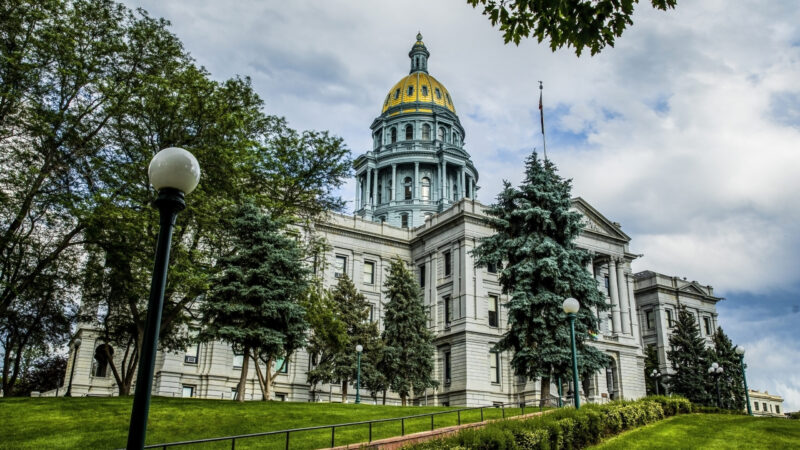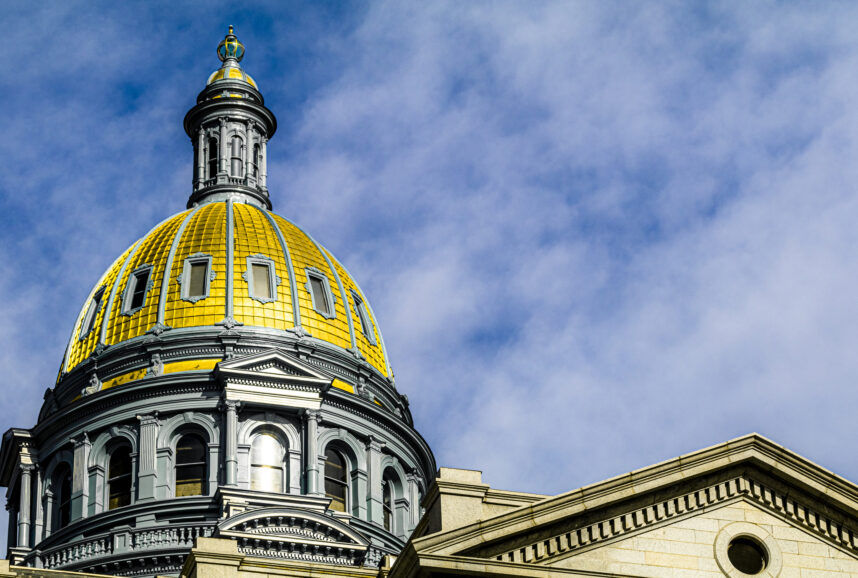Winter is nearly over (according to the calendar, at least), and state lawmakers in Denver are more than halfway through the 120-day Colorado General Assembly. In Washington, DC, senators and representatives from across the country are well into their own legislative work in Congress.
Some of that important legislative work pertains to public employees and their retirement benefits. Here we discuss key actions lawmakers have taken so far in 2023, as well as what may still be ahead.
Colorado legislation
So far this session, state lawmakers have introduced more than 400 bills, seven of which apply directly to Colorado PERA.
Four of those bills have been postponed indefinitely. That means the bill is no longer under consideration and these will not make it to the House or Senate floor for a vote. This can happen if lawmakers decide a bill needs more work or doesn’t have the support to pass.
Several other bills remain under consideration and are working their way through the process in the state legislature. Included in those bills is SB23-056, which aims to fully recompense PERA for the state’s missed 2020 payment of $225 million to PERA. Legislators passed a bill last year that aimed to make up that payment, and Gov. Jared Polis signed it into law. This new bill aims to pay PERA the remaining shortfall of $35.05 million.
Other bills currently under consideration include SB23-016, which would require PERA to include in its annual Investment stewardship Report a description of climate-related investment risks, impacts and strategies, and HB23-1176, which would create a new defined contribution plan for members of PERA’s School and Denver Public Schools divisions.
READ MORE: 2023 Proposed Legislation Status
As we saw last year, legislative work can continue all the way up to the last minute of the session, so there’s still plenty ahead. That includes the Long Bill, which lays out the State’s budget and spending for every state department and program for the next fiscal year. The Long Bill will be introduced in the Senate in late March. All legislative activity for the current session will wrap up by May 8.
Federal legislation
Lawmakers in Washington, DC have been working on bills affecting public employee retirement.
While Congress passed the package of retirement-related legislation collectively known as SECURE Act 2.0 in late December, many of its dozens of provisions don’t take effect until 2023 or 2024. Those include an increase in the age that retirees must start taking their annual required minimum distributions (RMDs) and new types of penalty-free distributions from retirement accounts.
READ MORE: What’s in SECURE 2.0?
Congress is also tackling an issue that comes up every session: Social Security’s Windfall Elimination Provision and Government Pension Offset. The two provisions of federal law can reduce Social Security benefits for members of Colorado PERA, which serves as a substitute for Social Security. While lawmakers have introduced bills addressing the WEP and GPO in every session of Congress in recent years, the bills never make it to a floor vote for full consideration, with lawmakers citing the cost as a key reason.
So far this year, lawmakers have re-introduced last year’s Social Security Fairness Act, which seeks to repeal both the WEP and GPO. Last year, we saw multiple similar bills, with some aiming to modify the WEP and GPO calculations rather than repealing them. It remains to be seen whether lawmakers will introduce other bills on the topic this year.
As always, PERA On The Issues will continue to track these topics and others that come up throughout the year. You can subscribe to our biweekly email newsletter to stay in the loop, as well as sign up for the PERA Ambassador email list to be informed about important legislative activity.
Windfall elimination provisionA provision of federal law that may reduce Social Security benefit payments to retirees who receive a pension based on work during which they did not contribute to Social Security. The WEP does not apply to those with 30 or more years of substantial earnings in Social Security.StewardshipThe practice of overseeing or managing something entrusted to one’s care. PERA’s approach to investment stewardship is focused on ensuring the financial sustainability of the fund that pays benefits to retirees and beneficiaries.StewardshipThe practice of overseeing or managing something entrusted to one’s care. PERA’s approach to investment stewardship is focused on ensuring the financial sustainability of the fund that pays benefits to retirees and beneficiaries.Government pension offsetA provision of federal law that reduces Social Security dependent benefit payments to spouses, widows, and widowers who receive a government pension like PERA.Postponed indefinitelyA motion that halts all further consideration of a bill. In practice, this means the bill has failed.Defined contributionA type of individual retirement plan in which an employee saves a portion of each paycheck (along with a potential employer match) and invests that money. The employee’s retirement benefit is based on their account balance at retirement. A 401(k) is a type of defined contribution plan.





Checking in on legislative activity…?
Thanks for this article, addressing the political reality that politician are NOT helping retirees… In fact, lawmakers are hurting retirees through their inaction. Essentially there’s NO activity under the gold dome to restore the COLA taken from PERA members. Likewise, Congress has failed to rescind the 1983 reductions in Social Security for retirees with state and local pensions, like PERA.
This article draws attention to what is painfully conspicuous by its absence, i.e., any legislative activity … to treat retirees fairly!
Therefore, we have only ourselves and/or our fellow PERA members for not relentlessly contacting enough state and federal elected representatives, in order to politely, but firmly, demand they provide a COLA and repeal WEP/GPO, respectively!
I hope retirees neither get discouraged by contacting politicians nor succumb to their bogus excuses for continuing to short change us. We have to lobby the politicians, as PERA Board & Staff (PERA BS) work for them (not us, the politicians made sure of that).
In closing, I think posting comments on this website urging elected representatives to treat us fairly (or blaming PERA BS for not lobbying on our behalf) are misdirected, if one has not already contacted their elected representatives directly, but on the other hand I think letting PERA BS know how we feel is quite appropriate.
this hits the nail right on the head. We earned both, SS as well as the PERA benefit.
I doubt that I will ever see a nickel of my earned SS.
Also, if we ever needed to reinstate the COLA it is now with inflation running rampant.
Thank you for your insiteful statement.
G M Santo,
Very well said! It’s going to take all of us to get the politicians, law makers and PERA to take the COLA issue seriously. If anyone really believes the bottom line numbers that PERA provides to the Legislature you are truly being misled. PERA is more stable than what they present.
Well said G M Santo! Here is a link for those of you who want to locate and contact your state representatives.
https://leg.colorado.gov/find-my-legislator
Once again, G.M. Santos nails it. Well done and thank you!
H.R. 82, to repeal WEP/GPO, now has 200 cosponsors. 290 are needed to send it to a vote. Please contact your Congressmen and ask them to cosponsor, if they have not already. The Ways & Means committee slowed the process down in the last Congress, but there is more time to get through that process in this new Congress. The Ways & Means committee’s only excuse for slowing it down was that paying those affected would move the 2034 date when Social Security would become insolvent, up to 2033. One year. The insolvency of Social Security is not caused by those of us who are not getting the benefit we paid for. The committee never mentioned that in 2023, Social Security tax is not paid on wages over $160,200. Moving that cap up would be an option. The Ways & Means video was September 20, 2022.
The repeal of WEP is desirable, necessary, and fair.
But it does nothing to hold accountable the organization we were ‘automatically’ attached to as young teachers. We Didn’t/ Couldn’t have a choice.
Regardless of what happens with WEP, legislation must be introduced and vigorously defended to uphold the contracts we fulfilled in good faith over a span (in my case, and many others) of 30 years. Colorado is in debt to me, approximately 100k since the 2010 taking of the “guaranteed annual increase “ ( their exact terminology in every pre-retirement meeting I attended, and in the brochure I still have !)
NOOOO to SB 23-016.. .. Govt should Not tell investment professionals what and what not to invest in
They should invest in what ever gives the largest gains. Leave politics out of investing strategies. When politicians get involved all they do is hurt the average person.
Dear Citizens: If I have done this correctly, below, is a last year’s copy of a letter from Sen. Bennett. In 2022, this bill failed. Both “sides” are concerned about cost; it will be a hard sell. It contains some FACTS. I told the Senator’s rep., I would like to be able to present this letter to the public. Please write to your Congressperson and Senator, for 2023. The bill will need to be modified, reduced costs, benefits, for any chance to pass, at all.
Dear Mr. Howard,
Thank you for contacting me regarding Social Security benefits. I appreciate hearing from you on this issue.
As you may know, Social Security covers approximately 178 million Americans, which means they pay into Social Security through payroll taxes and receive benefits upon retirement, disability, or death. Social Security, however, does not cover certain government employees who pay into government pension programs.
The current law creates challenges when workers with government pensions have spouses who pay into Social Security, and when workers with government pensions have also held a job that Social Security covers. Two provisions of the current Social Security law known as the Government Pension Offset (GPO) and the Windfall Elimination Provision (WEP) affect workers under these types of circumstances.
In cases where Social Security covers one spouse and a government pension covers the other, the worker who receives the government pension is still entitled to the spouse’s Social Security benefit. However, as a result of the GPO, that benefit is reduced by two-thirds of the worker’s government pension. Under some circumstances, the GPO can result in spousal benefits that are even lower than they would have been had that worker been covered by Social Security instead of a government pension.
The WEP affects workers with pensions who have also held a Social Security-covered job. Typically, monthly Social Security benefits are based on a worker’s average monthly earnings – workers are entitled to 90 percent of the first $826 of their average monthly earnings, 32 percent of earnings between $826 and $4,980, and 15 percent of earnings above $4,980. Workers affected by the WEP, however, are only entitled to a payment of 40 percent of the first $826 of their average monthly earnings.
I understand your concerns that the GPO and WEP have denied many pensioned workers and their spouses the Social Security benefits they rightly deserve, which is why I am a strong supporter and cosponsor of The Social Security Fairness Act. This bill would repeal the GPO and WEP provisions of the Social Security Act. The Social Security Fairness Act has been referred to the Senate Finance Committee. As a member of this Committee, I will keep your thoughts and concerns in mind.
I value the input of fellow Coloradans in considering the wide variety of important issues and legislative initiatives that come before the Senate. I hope you will continue to inform me of your thoughts and concerns.
For more information about my priorities as a U.S. Senator, I invite you to visit my website at http://bennet.senate.gov/. Again, thank you for contacting me.
Sincerely,
Michael F. Bennet
United States Senator
To reply to this message with a message to Senator Bennet or the office, please use the form at http://bennet.senate.gov/contact. Thank you.